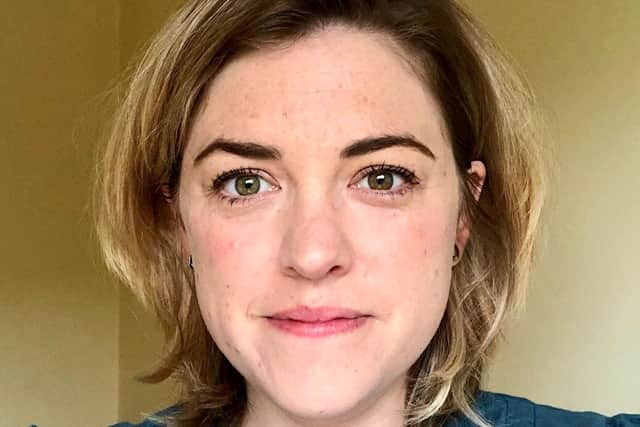'This is permanent brain damage' - Scottish mother who adopted child warns about effect of alcohol on unborn babies


Gemma Manning, from near Glasgow, adopted Isabelle when she was just eight months old.
Despite being born into tumultuous circumstances, which led the baby girl’s biological mother to give her up, Isabelle was ‘a smiley happy baby.’
Advertisement
Hide AdAdvertisement
Hide AdBut by the time she was about two years old she started to develop violent and aggressive behaviour, leaving Gemma with bruises and bite marks all over her body on a regular basis.
“People would often say to me: ‘you need to go on a parenting course’, or, ‘it’s just a phase of naughty behaviour and she will grow out of it,” the 38-year-old trained music therapist said.
“It was distressing to hear because my husband Scott and I were doing everything we could, but her behaviour was getting more extreme and no one could give me an answer as to why.”
After two more years of going back and forth to various doctors, child therapists and paediatricians, Gemma’s Isabelle was diagnosed with Fetal Alcohol Spectrum Disorder (FASD) – a group of conditions that can occur in a person whose mother drank alcohol during pregnancy.
“For years we were wondering why she wasn’t being diagnosed with autism or ADHD but she never ‘fit’ those boxes,” Gemma said.
“I ended up calling Adoption UK for some guidance by the time Isabelle was four because I was fighting a losing battle,” Gemma said.
“It was through contact with them that FASD was mentioned to me.
“We were then in touch with a paediatrician who knew about the condition and she diagnosed Isabelle with FASD.
‘More common than autism’
Advertisement
Hide AdAdvertisement
Hide AdFASD affects one more than one in three adopted children, according to Adoption UK – 35 per cent are either diagnosed with or suspected to have the condition.
Common symptoms include a flat upper lip, eyes slightly wider apart than normal and a smaller skull circumference, all of which Isabelle shows.
Almost two thirds (63 per cent) of families polled in Scotland had waited two years or longer for a diagnosis, and more than half (53 per cent) felt healthcare professionals lacked basic knowledge about the condition – despite FASD being more common than autism.
“This is permanent brain damage; the consequences of the condition are huge and professionals don’t seem to know much about it,” Gemma said.
“There are nine brain functions it can affect and for Isabelle most are behavioural and sensory – and particularly violent.”
Mothers drinking during pregnancy
Gemma, who worked with autistic children before becoming a full-time mum, said her daughter’s biological mother claimed she did not drink during her pregnancy, but admitted to only finding out she was pregnant seven months in.
“I am fully aware some mothers drink without realising they’re pregnant,” she said.
“It would have probably happened to me.
“I don’t want to have a punitive discussion about women drinking during pregnancy because no mother would intentionally want to hurt their child. But I have seen FASD from the other side, and the severe impact it can have on a child and their future which makes me determined to encourage more awareness about it.”
Advertisement
Hide AdAdvertisement
Hide AdIsabelle, who is now six years old, has started a new school and Gemma has told teachers and parents about her daughter’s condition, most of whom she said had never heard of it.
“I explain the FASD, but I don’t always say Isabelle was adopted. It does make me wonder what parents and teachers might think of me.
“But even if she wasn’t adopted, and she was mine, and I had drunk without realising I was pregnant, it shouldn’t be something that is judged.
“The way to go about change is not to shame people.”
Medical staff need more training
Despite her challenges, Gemma said Isabelle’s language and maths skills are exceptional and she behaves well at school.
“It’s only when she comes home and she’s with me that she can become aggressive and violent.
“If I could wave a magic wand I would ask all medical staff who work with children to have basic FASD training because having the diagnosis has certainly helped us get the support.
"And the younger the child, and the more professional help they receive, the better.
“She is the most amazing little girl. She’s smart and determined, and I want nothing more than for her to learn how to channel this into positive action because I have every faith she will go really far.
Advertisement
Hide AdAdvertisement
Hide Ad“But we need to bring this condition more into the spotlight, to give children suffering from FASD and their families more support.”
Scotland’s approach to FASD
Scotland is leading the field in the UK as the first nation to establish an FASD diagnostic pathway, according to Adoption UK.
Last year, the organisation was backed by the Scottish Government to launch FASD Hub Scotland, supporting all parents and carers of people who were, or may have been, exposed to alcohol during pregnancy.
FASD Hub Scotland project manager, Aliy Brown, said: “We have been working closely with professionals in Scotland, other parts of the UK and further afield to drive the campaign around the need for awareness of FASD, both for prevention as well as support for families, which is so badly needed, as evidenced in the report.
"We are committed to doing everything we can to see the condition recognised in the same way the other neuro-diverse conditions are, and enable both individuals and their families to access early diagnosis, support and intervention to promote positive outcomes for life.”